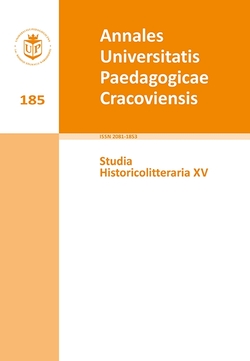Лексемы: «война», «борьба» и их употребление в современном русском языке
Main Article Content
Abstract
Lexemes "war", "battle" and their use in the modern russian language
The notion of “war” plays a crucial role in Russian linguistic worldview. On the basis of the material analyzed, one can observe that the concept of “war” represents a complex mental product which is reflected in various types of linguistic units. The purpose of cognitive interpretation of “war” is presenting how the conceptualizer formulates such a fragment of reality.
Semantic fields of the analyzed concept as used in everyday contexts constitute the theme of the paper. Material used was extracted from Russian dictionaries with explainations and confronted with everyday use of given lexis in war literature and periodicals. In recent years, the notion of Chechen War became strongly lexicalized. One can observe certain regularities conntected with describing the concept. The neutral lexeme “war” in specific conditions is subsituted with a softer linguistic sign of “battle”. The latter may have positive connotations if we consider righteous cause and ultimate values.
Key words: war; fight; conceptualization; concept; lexem; lingwistic picture of the world;
Downloads
Article Details

This work is licensed under a Creative Commons Attribution-NonCommercial-NoDerivatives 4.0 International License.
COPYRIGHT POLICY
The publisher of "Annales Universitatis Paedagogicae Cracoviensis.Studia Historicolitteraria" is authorised to use and distribute all the materials published in the journal on the basis of a non-exclusive licence agreement unlimited in time – previously concluded for an indefinite period of time each time with the author of a specific paper in the fields of exploitation specified in the agreement.
OPEN ACCESS POLICY
"Annales Universitatis Paedagogicae Cracoviensis.Studia Historicolitteraria” is an open access journal, and all its contents are available for free to users and/or their institutions on the basis of non-exclusive licenses under Creative Commons (CC BY CC-BY-4.0). Users can read, download, make copies, distribute, print, search, or to link to full text articles in this journal without the prior permission of the publisher or the author.This is consistent with the definition of open access BOAI (http://www.soros.org/openaccess).
References
Apresjan J., Semantyka leksykalna. Synonimiczne środki języka, Wrocław, Warszawa, Kraków, Gdańsk 1980.
Bremer J., Martin Heidegger i Ludwig Wittgenstein o milczeniu [w:] Forum Philosophicum 7, Kraków 2002.
Karolak S., Elipsa [w:] Encyklopedia językoznawstwa ogólnego, pod red. K. Polańskiego, Wrocław–Warszawa–Kraków 1999.
Kiklewicz A., Zrozumieć język. Szkice z filozofii języka, semantyki, lingwistyki komunikacyjnej, Łask 2007.
Kudra A., Językowe wyznaczniki obserwatora w tekście literackim (na przykładzie „Granicy” Zofii Naukowskiej), [w:] Punkt widzenia w języku i kulturze, pod red. J. Bartmińskiego, S. Niebrzegowskiej-Bartmińskiej i R. Nycza, Lublin 2004.
Langacker R., Wykłady z gramatyki kognitywnej, pod red. H. Kardeli, Lublin 1995.
Grzegorczykowa R., Wprowadzenie do semantyki językoznawczej, Warszawa 1995.
Przybylska R., Kategoria punktu widzenia w badaniach nad relacjami przestrzennymi w języku, [w:] Jerzy Bartmiński, Stanisława Niebrzegowska-Bartmińska, Ryszard Nycz, Punkt widzenia w języku i w kulturze, Lublin 2004.
Rokoszowa J., Milczenie jako fakt językowy [w:] Biuletyn Polskiego Towarzystwa Językoznawczego, z. L, Kraków 1994.
Waszakowa K., Punkt widzenia konceptualizatora jako kategoria kognitywnego opisu derywatów słowotwórczych, [w:] Punkt widzenia w języku i kulturze, pod red. J. Bartmińskiego, S. Niebrzegowskiej-Bartmińskiej i R. Nycza, Lublin 2004.
Мурзин Л. Н., Основы дериватологии, Пермь 1984.
